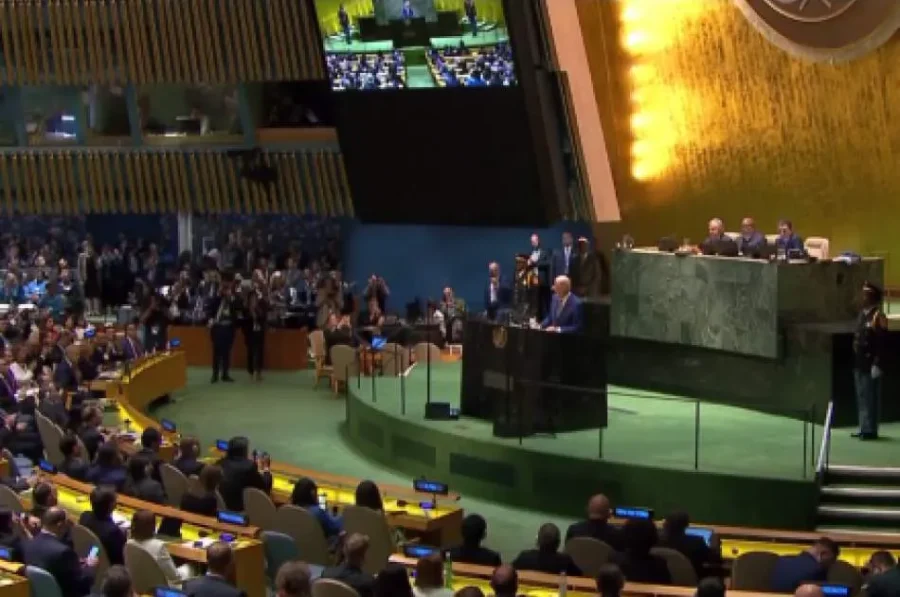The leaders of Qatar, Iran, Uzbekistan and Turkey discussed Afghanistan among other issues at the 78th session General Debate of the United Nations General Assembly.
In this discussion, Turkey and Iran emphasized the necessity of forming an inclusive government in Afghanistan.
“Regardless of political motives the transport transformation of the interim government into an inclusive administration in which all segments of society are fairly represented will pave the way for Afghanistan and will be positively received in the international arena,” Recep Tayyip Erdoğan, president of Turkey, said.
“In Afghanistan, Iran insists on an inclusive government with the participation of Afghan groups and population, but the assistance of the world is needed in order to address the crisis of refugees who have been driven from their land from Afghanistan, a great many of whom are given refuge in Islamic Iran today,” Iran’s President Ebrahim Raisi said.
Although US President Joe Biden did not say anything about Afghanistan, Qatar and Uzbekistan underlined their concerns about the humanitarian situation in Afghanistan and demanded that humanitarian help to the Afghan people continue.
Speaking at the general debate of the 78th Session of the General Assembly of the United Nations, Sheikh Tamim bin Hamad Al Thani, Amir of the State of Qatar, asked the current Afghan government to stick to its commitments in the Doha Agreement.
“Regarding the situation in Afghanistan, we continue to coordinate international efforts and facilitate dialogue with the UN and the countries concerned, in addition to the caretaker government of Afghanistan, to ensure compliance with the Doha agreement to avoid the recurrence of past mistakes and to prevent Afghanistan from spiraling into a difficult-to-manage humanitarian crisis or becoming a safe haven for terrorist individuals and groups. We also have to work to ensure that the Afghan people receive the needed international support and assistance and enjoy human rights, particularly minority rights and women’s rights to education and work,” Sheikh Tamim noted.
Uzbekistan’s President Shavkat Mirziyoyev also said in the discussion that leaving Afghanistan alone would be a grave mistake.
“Leaving Afghanistan again alone with its own problems would be a grave mistake. Ignoring, isolating, and imposing sanctions only exacerbates the hardships faced by the ordinary Afghan people. We believe that humanitarian aid to the Afghan people should not be reduced,” he said.
Meanwhile, the Global Centre for the Responsibility to Protect, Open Society Foundations as well as ministers of various countries in a statement reiterated their “strong concerns” over the Afghan women situation in Afghanistan and urged the Islamic Emirate to lift these restrictions immediately and to safeguard humanitarian principles.
The joint statement of Albania, Belgium, Cabo Verde, Costa Rica, Croatia, Denmark, France, Germany, Guatemala, Liechtenstein, Luxembourg, Malta, and Spain stated that “since (the Islamic Emirate) returned to power in August 2021, women and girls have been slowly but surely erased from public life through a series of edicts targeting them.”
According to the statement, “an inclusive and representative political process with the full participation of all Afghans, including women and girls, and persons belonging to ethnic and religious groups and minorities, is required to ensure sustainable peace, stability, and prosperity in Afghanistan.”
Jalil Abbas Jilani, foreign minister of the caretaker government of Pakistan, while delivering his remarks at an Asia Society event said that engaging the Afghan interim government is much more likely to deliver results.
“We also share the international community’s concerns over human rights situation in Afghanistan, especially issues related to women’s rights, girls’ education and women’s employment. We will continue to raise these issues with the Afghan interim administration. We believe that instead of coercive measures, engaging the Afghan interim government is much more likely to deliver results,” Jilani noted.
However, the Islamic Emirate has not commented on the remarks of the leaders of these countries, but it denies the violation of women’s rights in Afghanistan.










